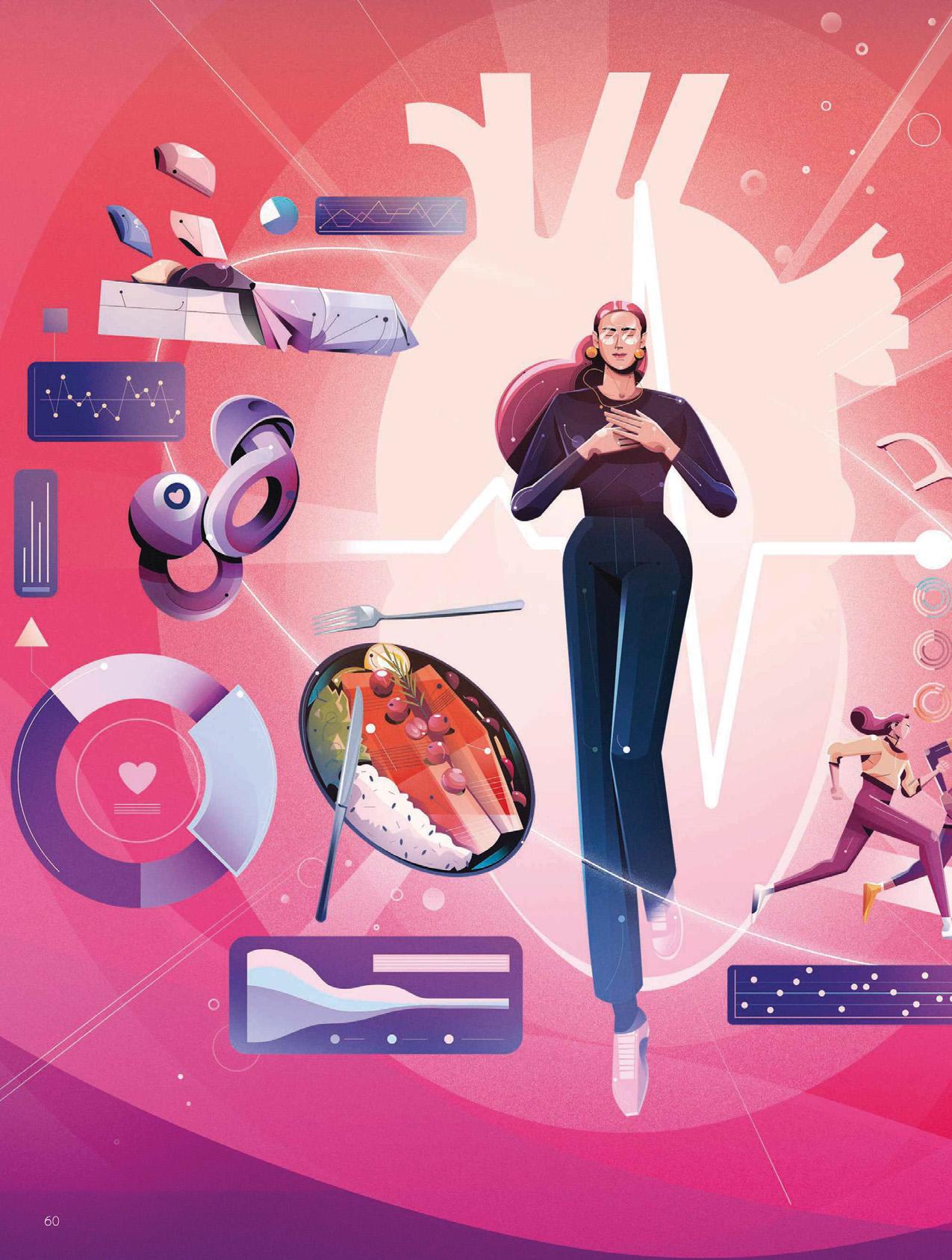Prøve GULL - Gratis
GET HEART SMART
BBC Science Focus
|March 2025
NEW STUDIES HAVE SHOWN THAT SEVERAL SMALL LIFESTYLE CHANGES CAN DRASTICALLY IMPROVE YOUR HEART HEALTH

Modern life isn’t doing our hearts any favours. We sit too much (over nine hours a day, on average), are regularly overwhelmed by stress (now linked to chronic inflammation – a key risk for heart disease) and fill more than half of our plates with ultra-processed foods (shown to drastically increase stroke risk). It’s little wonder heart disease is now the world’s number one killer, accounting for 13 per cent of all deaths on Earth, according to the World Health Organization.
It gets worse. Research suggests that heart disease risk is now rising with each new generation: a University of Oxford study found that people in their 50s and 60s today are up to 1.5 times more likely than their grandparents to develop heart disease at the same age.
Rising obesity rates, as you’d guess, play a role here. But worrying recent research from Harvard Medical School suggests that even people with a normal body mass index could be at risk due to hidden ‘fatty muscles’. After studying 700 people admitted to hospital with shortness of breath (but whose arteries weren’t clogged), the scientists found that those with more fat lodged in their muscles were more likely to have damage to the tiny blood vessels supplying the heart. Six years later, these people were more likely to be hospitalised for heart disease and had a much higher risk of premature death.
New hidden risks to your heart seem to appear every month. But, reassuringly, so does new evidence for the benefits of keeping your body’s hardest working muscle healthy. One intriguing study by University College London, for example, has found that having a healthy heart at age 50 can lower your overall risk of developing dementia, even if you’re already experiencing cognitive decline.
Recent research has also suggested better heart health can improve your mental resilience, increase your overall life satisfaction and may even slow ageing. According to the
Denne historien er fra March 2025-utgaven av BBC Science Focus.
Abonner på Magzter GOLD for å få tilgang til tusenvis av kuraterte premiumhistorier og over 9000 magasiner og aviser.
Allerede abonnent? Logg på
FLERE HISTORIER FRA BBC Science Focus

BBC Science Focus
ARE PSYCHOPATHS REALLY THAT GOOD AT LYING?
Picture infamous psychopaths from fiction, such as the eerily cold and calculating Patrick Bateman in the film adaptation of American Psycho, and they certainly seem like master deceivers. But what about real-life psychopaths? Research confirms that psychopaths are more inclined to lie to get what they want, and that they typically display a striking fearlessness - as if they have ice running through their veins.
1 min
January 2026
BBC Science Focus
WHY DO WE HAVE TWO OF SOME ORGANS, BUT ONLY ONE OF OTHERS?
The majority of animals on Earth, humans included, are bilaterally symmetrical. It means we can be divided roughly into two mirror-image sides. Evolutionary biologists believe that it has been like that for at least 300 million years, and because life organised this way survived, so did symmetrical design. Hence, two eyes, two ears, two lungs and two kidneys.
1 min
January 2026

BBC Science Focus
WHY DO CATS PREFER TO SLEEP ON THEIR LEFT?
I've said it before, and I'll keep saying it again and again and again: who knows why cats do anything?
1 min
January 2026

BBC Science Focus
FORGET COUNTING CALORIES TRY THIS INSTEAD...
Calorie counting isn't just difficult, it's riddled with problems that make it practically useless for anyone trying to lose weight.But there are alternatives
9 mins
January 2026

BBC Science Focus
SIGNS OF LIFE
The more planets we find outside our Solar System, the better our chances are of finding life on one of them. But if there really is life out there, how do we spot it?
8 mins
January 2026
BBC Science Focus
WHAT ACTUALLY MAKES SOMEBODY COOL?
Most of us have probably wanted to be cool at some point in our lives, and these efforts can have a big influence on the things we buy, the way we dress, the hobbies we invest in, the people we look up to and even the words we use.
2 mins
January 2026

BBC Science Focus
It's TIME to WAKE UP and SMELL the roses
What if the pursuit of happiness in the traditional sense – chasing wealth or power – is the very thing stopping you from being happy? Researchers are beginning to understand that spending time enjoying the simple things might be the secret ingredient to enjoying a happy, healthy life
8 mins
January 2026

BBC Science Focus
THE AARDVARK
In a time when people are being asked to consider eating insects, we should, perhaps, learn a thing or two from the aardvark (Orycteropus afer), Africa’s ant-guzzling gourmand. On an average night, the big-schnozzed mammal devours up to 50,000 of the crunchy critters.
2 mins
January 2026

BBC Science Focus
ADD WEIGHT TO LOSE WEIGHT
A very basic kind of wearable could make your New-Year-weight-loss plans stick
3 mins
January 2026

BBC Science Focus
AHEAD OF THEIR TIME
The Maya civilisation is known for its art and architecture.
8 mins
January 2026
Listen
Translate
Change font size

